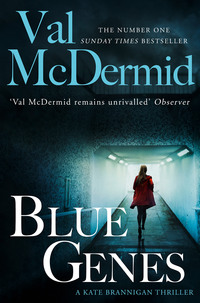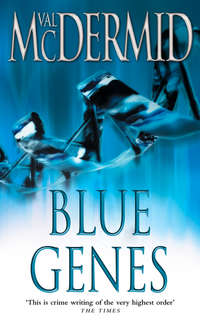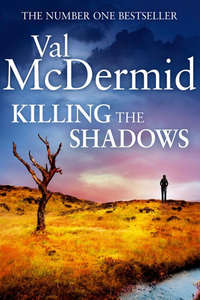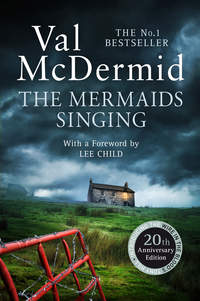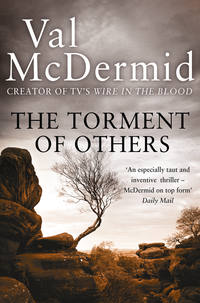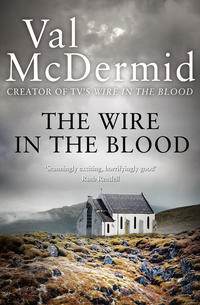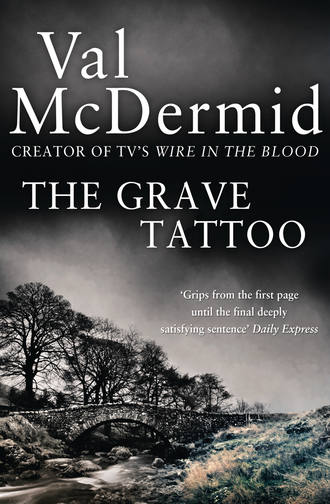
Полная версия
The Grave Tattoo
It wasn’t that he felt guilty. He’d convinced himself he was right not to tell Jane the whole truth about Caroline. It would only hurt her. Instead, he’d explained that there were good practical reasons why he and Jane should loosen the bonds of their relationship–he’d have to travel for work, he’d be away in Greece for a couple of months, it wouldn’t be fair on Jane to hang around waiting for him. He’d said that Caroline was in her early forties, but had omitted to mention her lean, lithe frame, her shapely legs, her swatch of dark blonde hair or her dancing green eyes. Or that sex with Caroline had been a breathtaking adventure, right from the first cocaine-fuelled fuck at Tom D’Arblay’s party. The party Jane had had to miss because she was giving a paper at some stupid bloody symposium in Cardiff.
He’d thought it was a one-shag stand. Nobody had been more surprised than he when Caroline had texted him the next day to suggest they meet for a drink. Over cocktails in a chic Soho bar, Caroline had been bright and brilliant, showing him an autograph letter from John Keats that she’d bought only that afternoon. Then she’d put a proposition to him. She was tired of being a one-woman band. She wanted an associate in her business buying and selling rare documents. He was, she said, the one she wanted. He knew enough of the technical aspect of what they would be buying and selling to avoid the pitfalls of obvious forgeries and faked provenances. He was clearly smart and ambitious. ‘And you’re a pretty good fuck too,’ she’d added, smiling wickedly over the rim of her glass.
She’d given him a week to think it over. He’d made his decision by the next morning. His boss had been furious, Jane had been appalled at his abandoning the supposed purity of museum life for the cut-throat world of collectors and high rollers, and his father had warned him about what happens when beautiful women get bored. None of it had mattered. For the first time in a long time, Jake was having fun. Crete had merely seemed the icing on the cake.
Until reality had replaced the fantasy and he found himself bored for the first time since the age of thirteen.
Jake drew up outside the cottage. He ran his hands through his thick dark hair, wondering whether Caroline would read the meaning in the newspapers. He grabbed the shopping and added the contents of his bags to the food already arranged on the patio table. Caroline emerged with a jug of freshly squeezed juice just as he slumped into a chair, clutching the papers like a shield in front of his chest.
A smile quirked one corner of her mouth. ‘Well done, Jake,’ she said, filling the tumblers.
‘What?’
‘You held out longer than anybody else I’ve ever brought here. Three weeks and two days. That’s a record.’ She leaned over and kissed him, rumpling his hair with one hand and running the other over the front of his shorts.
‘You don’t mind?’ Jake said, wrong-footed.
‘Why would I mind? I’m not an ostrich. I’m not here to escape.’ She slid elegantly into her chair and tipped her sunglasses from her hair to cover her eyes. ‘I’m here because I love it and it’s possible for me to be here without fucking up my life or my business. The only reason I don’t have you buy a paper every morning from Koutras is that I read the bloody things online, sweetie.’
They settled into their papers, Jake smarting at Caroline’s condescension. He was beginning to wonder how seriously she took his expertise; too often, he was left feeling like a gigolo, appreciated only for his bedroom skills and not for the quality of his mind. He was only half taking in what he was reading, but when his eyes stumbled over a familiar name he stopped short and returned to the beginning of the story. ‘Fuck me,’ he breathed softly.
Caroline glanced up. ‘I rather thought I had,’ she teased. ‘What is it, darling?’
Jake shook his head. ‘Nothing, really.’ He passed the paper across the table, pointing to the story. ‘It’s just that I know the place where it happened.’
Caroline skimmed the story. ‘Fellhead,’ she said, her voice clipped and her face unreadable. ‘Would that be where the lovely Jane hails from?’
Neither of them had spoken much of their past by tacit agreement, but Jake had mentioned spending time in the Lakes with Jane when Caroline had been thinking of buying a bundle of Robert Southey’s letters. ‘That’s right,’ he said. Then he grinned. ‘I hope she’s seen that story.’
‘Why? Because Fellhead doesn’t hit the headlines often?’
‘No…’ He leaned across and pointed to the penultimate paragraph. ‘Because she’ll be convinced this is evidence of one of her hare-brained theories.’
‘I don’t understand,’ Caroline said in a tone that indicated this was seldom her chosen state.
‘The black tattoos. They’re the sort that sailors used to get in the South Seas back in the old days when sailing ships put in at the islands to take on stores and trade with the natives,’ Jake explained. ‘For example, most of the sailors on the Bounty had tattoos done while they were in Tahiti collecting the breadfruit they were supposed to be bringing home.’
‘What an arcane piece of knowledge.’
‘Jane lectured me so often on her pet theory that it stuck.’ Jake leaned back in his chair, pleased to be in the driving seat for once. ‘She believes that Fletcher Christian didn’t die on Pitcairn. That he came back to the Lakes where he was sheltered by his family. It’s a rumour that’s been going the rounds up there for the best part of two hundred years.’
‘Amusing,’ said Caroline. ‘And amazing how urban legends sprang up even before the urban sprawl itself.’
He grinned, sharing her enjoyment. ‘But Jane has taken it one step further. That’s the hare-brained part. She’s convinced that, if Christian came home, he would have been burning to tell his story, to set the record straight.’
‘She’s probably right,’ Caroline said, languidly reaching for her cigarettes and lighting up. ‘In his shoes, who wouldn’t want to get their side of the story out there?’
‘Well, Jane believes that he looked up his old schoolfriend William Wordsworth and told him his version of events. And that William wrote it all down as a long narrative poem, which of course he could never publish without dire consequences for himself and for the entire Christian family.’
Caroline was sitting up straight now, yanking her sunglasses off and fixing him with a hard stare. ‘Fletcher Christian was at school with Wordsworth?’ she demanded.
‘Apparently. Jane says that part of the story is incontrovertible fact. But the rest of it is rumour, gossip and Jane’s fantasy.’
‘Jake, do you have any idea what such a poem would be worth, supposing it really existed?’ Suddenly, the cloak of Crete had fallen back to reveal the sharp London dealer that he had first met.
He frowned, uneasy and wrong-footed. ‘I’d never given it any thought. A hundred thousand?’
Caroline shook her head in disbelief. ‘At least ten times that. Probably more. I’d estimate between one and two million, depending on how long the poem is.’
Jake whistled. ‘Pity it’s not for real,’ he said firmly.
Caroline stared at him with an unreadable expression. ‘How do you know it’s not for real?’
Jake spluttered. ‘There’s no evidence that it exists. That it ever existed. Just Jane’s crazy idea.’
‘That would be the same Jane who is a Wordsworth scholar?’ Caroline said, acid behind the sweetness.
‘Yes, but…’
‘So she presumably knows what she’s talking about.’
‘You can’t be taking this seriously,’ Jake protested, anger simmering below the surface as he felt himself being dismissed yet again.
‘You’re at the start of your career in this business, Jake. Can you afford not to take it seriously?’
I told him I was willing to consider his request favourably, except that I feared there would be unpleasant consequences if I were to publish such an account. ‘You are, a wanted man & if I were to claim for my Poem the name of truth, I would be tarred with the same brush. Harbouring a known felon is an offence against His Majesty and I should be loath to deprive my wife of a husband and my children of a father even to defend the honour of an old friend such as you. Further, it would incite a manhunt against you in this place where you feel most safe.’ This was not a concern that had occurred to my friend, but he was quick to see its force. ‘It is not for myself that I care what is said, but for my family,’ he said. At length, we agreed that if I were to forge a Poem from his tale nobody should be made privy to it until we both were dead. Thus would we protect ourselves and clear his reputation in one fell swoop.
7
Professor Maggie Elliott looked over the rimless glasses perched on the end of her nose. ‘It seems to me, Jane, there are two discrete elements here. One is the letter from Mary Wordsworth which alludes to something that, as far as we can tell, has not been elucidated by any other scholar. The second is the discovery of a body in the Lake District which may or may not have tattoos typical of the South Sea Islands during the period of the mutiny on the Bounty. Would you agree with that analysis?’
Jane shifted slightly in her seat. ‘Well, yes.’
‘But you have it in mind that these two elements could be inextricably woven together? Based on little more than a rumour you heard as a child?’
‘A rumour that has persisted for the best part of two hundred years,’ Jane said, a cast of stubbornness settling on her face.
‘But a rumour nonetheless.’
Jane hated the way Professor Elliott assumed the pedantry of an Oxbridge don in spite of having acquired all three of her degrees at redbrick universities. Given her age, she should be a laid-back egalitarian, not some fogey acting twenty years older than her age and several gradations above her class. ‘A rumour that is backed by a significant amount of circumstantial evidence,’ she said, determined not to be worn down. ‘As I outlined to you. And there is one other detail…’
Professor Elliott raised her eyebrows interrogatively. ‘Yes?’
‘The notebooks of Samuel Taylor Coleridge are in the British Museum and one of them contains the entry: “Adventures of Christian, the mutineer”. The same notebook he was using during the period when he composed The Ancient Mariner. And when you read the poem in that light, it’s not hard to spot links to the Bounty’s voyage.’
‘Such as?’
‘The terrible storms they endured going round the Cape. The way they were driven south towards the ice before making it through into the South Seas. And the albatross. It’s a matter of record that the Bounty’s crew shot and ate albatross during their voyage. As far as I know, there was no superstition attached to killing those particular birds at that time. But for his poem to work, Coleridge had to invent a metaphor for sin. And killing a beautiful wandering bird suited his romantic soul right down to the ground.’ Jane’s hands wove a sensuous pattern in the air as she described the bird. ‘However, what we also know from contemporaneous accounts is that it was Wordsworth who came up with the idea of the albatross on one of their walks together. I don’t think it’s reaching to suggest that the notion had already been planted in his mind by what he knew of the Bounty.’
Professor Elliott shook her head. ‘Your timing’s wrong, surely. Coleridge was working on The Ancient Mariner when he and Wordsworth were in Dorset. It’s much too early for Fletcher Christian to have been back in England. And certainly there’s no reason to suppose he was in Dorset.’
Jane nodded. ‘I’m not suggesting Wordsworth knew the story at first hand from Fletcher at that point. But I think it’s indicative of an existing interest in the mutiny. And in Edward Christian he had the perfect source to satisfy his curiosity. Edward would almost certainly have heard about the killing of the albatross from the mutineers who were brought back or from Bligh’s accounts. It’s exactly the sort of detail that would have struck Wordsworth. And if William had already shown an interest in the mutiny, all the more reason why Edward would send Fletcher to him when he finally came home.’
Professor Elliott gave a smile that was hard not to take as condescension. ‘That is even more tenuous a theory than this putative concatenation of body and letter. What leads you to the belief that there is some urgency attached to the exegesis of the letter?’
In the three hours since she had left Dan, Jane had taken the opportunity to marshal her arguments. ‘It’s not just the body that makes the matter more urgent. The Jerwood Centre is about to open at the Wordsworth Trust. Sooner rather than later, every scrap of paper in that archive is going to be scrutinised, and it’s likely that whoever comes across that letter from Mary will know enough about what they’re looking at to realise it needs to be followed up. I found that letter. I want to be the one who gets on the trail of whatever it means.’
Professor Elliott sighed. ‘This can scarcely be news to you, Jane. You say you encountered this letter a year ago. Why did you not pursue it earlier? During the long vacation, say? Why wait till term has begun and you have a teaching load?’
Jane could feel anger rising and tried to keep her voice level. ‘Maggie, it may have escaped your notice, but I don’t earn enough from my teaching here to support myself. I spent a large part of the summer working behind a bar and the rest of it trying to turn my thesis into a book for which I have miraculously got a publishing contract. But even supposing I had had the time to follow this up, much of the Wordsworth archive has been inaccessible because of the renovations and building work. I couldn’t have done anything about it even if I had wanted to. Yes, the body does add urgency in my mind, but it’s far from the only consideration.’
Her department head smiled, this time without any air of patronage. ‘I do appreciate that, Jane. Believe me, if I could find a way to pay you and your fellow teaching assistants more, I would do it. I fully understand the negative impact it has on your research. And in spite of the conclusion you appear to have leapt to, I do not discount the potential significance of the bog body. If it proves to be that of Fletcher Christian, or indeed any other of the Bounty crewmen, it would increase exponentially the chances of there being a manuscript such as you posit.’ She pulled her computer keyboard towards her and flashed Jane a look over the top of her glasses. ‘Strange though it may seem to you, I do remember the excitement of academic discovery. It hasn’t been entirely subsumed by the weight of departmental administration.’ She clicked her mouse and studied the screen. ‘You’re teaching two seminars a week, and you’re supervising three students, is that right?’
‘That’s right. But–’
Professor Elliott raised a finger to demand silence as she navigated her way around the departmental timetable. ‘Let me see,’ she drawled.
‘Dan Seabourne has volunteered to take over my teaching load for a couple of weeks, provided we can rejig the timetable so the two seminars are on the same day.’ Jane risked interrupting the process.
Eyebrows raised across the desk. ‘Really? How unlike him to burden himself with more work.’
Jane grinned. ‘He’s not as lazy as he sometimes looks. It’s just that he hasn’t quite figured out where he’s going next, workwise.’
Professor Elliott harrumphed. ‘And you’re confident he has the expertise in your area to manage the work?’
‘I think so. They’re undergraduate seminars. It’s not that hard to stay one step ahead of the group. Not these days, with seminars the size lectures used to be,’ Jane added with a tang of acerbity.
‘Again, not something over which I have a deal of control,’ Professor Elliott said. She studied the screen again. ‘That should be manageable. Very well. Mr Seabourne it is. I’ll email him to make sure he knows when and where he is supposed to be. You have–’ she glanced at the timetable again–‘two weeks and three days before you need to present yourself for duty. I trust that will be long enough.’
Jane got to her feet. ‘If I’ve not started to make some headway by then, it’s not going to be susceptible to easy unravelling.’
‘And if you have?’
Jane reached for her bag. ‘Then I might be back here begging.’
Professor Elliott gave her a sharp look. ‘I do hope not. I don’t want your record looking like that of someone who is not committed to the department. One never knows when cuts will be demanded.’
It was, Jane thought as she walked down the dingy corridor, the nearest she was ever likely to get to a wholehearted endorsement from Maggie Elliott. It wasn’t exactly an enthusiastic encouragement to get cracking and find what she was looking for, but it was a damn sight better than nothing.
Dusk had already fallen over the towering fells and dark waters of the Lake District when the hearse pulled up at the discreet rear entrance of Keswick Memorial Hospital. The doors swung open to reveal a black body bag on a hospital trolley, a porter at one end. River Wilde supervised the loading of the precious cargo into the hearse then arranged to meet the undertaker’s men back at the funeral parlour.
We make a pretty strange cortege, she thought to herself as she eased the bulk of her Land Rover out of its car park space and into the wake of the hearse. Talk about the odd couple. A body with no one to mourn it and a forensic anthropologist who wants to steal all its secrets. A limo and a Landie. Hell, I could just have loaded the body in the back and not bothered the guys from Gibson’s.
It would have been much simpler to have left the body in situ at the hospital, but the administration had been adamant that their mortuary was for the use of the recently dead, not those who had been in the ground long before the hospital had even been dreamed of. She had reminded them that they had already agreed to rent her time on their equipment, which would mean bringing the body back, ‘like a large and inconvenient parcel,’ but they were not to be moved. Unlike Pirate Peat, as she had privately dubbed him. She wondered if that was the sort of human touch the TV team would appreciate.
She was feeling pretty pleased with herself. An hour before, Phil Toner had called to say he had decided to go ahead with the project. A researcher would be with her in the morning to discuss the schedule and arrange filming. Not only that, but they’d also accepted her figures at face value and agreed to the fee she’d suggested. She pulled a rueful face. ‘You sold yourself too cheap, girl,’ she muttered under her breath. But at least she would be able to afford all the techniques required to paint the fullest picture possible of her mystery man. It was an unusual luxury, since the practical side of her job normally involved the minimum required to identify human remains. Mostly, her work was about bringing closure to the living; the relatives of soldiers, of civilians lost in massacres, of victims of natural catastrophe, of climbers lost on mountains, of bodies buried in shallow graves. Identity was all. This, however, would be a different matter altogether. This was about unravelling one man’s story. Identification would be a bonus.
She followed the hearse into the car park behind the imposing Victorian villa that housed Gibson’s Funeral Services and waited patiently while the men shifted the body on to a trolley then wheeled it inside to the embalming room. According to Andrew Gibson, the thirty-something great-great-grandson of the first Gibson, it had been installed when the house had been built in 1884 and little had changed since except for the installation of more modern plumbing. The walls were white, brick-shaped tiles, the faint craquelure of age lending them warmth. The embalming tables were solid mahogany, their original ceramic liners replaced with stainless steel. The counter-tops and the cabinets were all of the same wood. Through their glass doors she could see beakers and measuring columns that could have dated from the same era. It wasn’t hard to imagine men in wing collars and frock coats going about their business with the dead inside these four walls. River had loved this place the minute she’d clapped eyes on it. She just knew the TV team were going to feel the same. It would, she hoped, feel like a Sherlock Holmes drama, only for real.
The men loaded their burden on to one of the tables. River slowly unzipped the bag and exposed the body to the air. She gazed down at the stained skin, the wizened limbs and the dark hair and tried to conjure up a picture of what he must have looked like in life. Once those legs had carried him over the tracks of the fells; once, she wouldn’t mind betting, they had held his balance on the pitching deck of a sailing ship. Those arms had raised sail, climbed rigging, spliced ropes. They had held other warm bodies. That mouth had kissed as well as eaten, spoken as well as drunk. He had been a living, breathing human, just like her. Now it was her job to make him come alive all over again.
Three hundred miles away, Jane was wolfing a generous bowl of spaghetti in Trattoria Guido with Dan and Harry. The restaurant was Dan’s discovery; he’d found it tucked away in an alley off a side street near the university. It looked as if nothing had changed inside since the 1970s–checked red-and-white tablecloths, guttered candles stuck in Chianti bottles, badly executed murals of Sorrento all gave it that time-warp feel. The menu, too, had been untouched by culinary fashion. A diner would look in vain for balsamic vinegar, sundried tomatoes, mozzarella di bufala or rocket. Here, the staples were spaghetti, penne and tagliatelle, the favoured sauces Bolognese, carbonara, arrabbiata and marinara. But the food was tasty, the portions vast and the prices low, so it had clung to its clientele of office workers and the kind of students who favoured content over form. Jane ate there at least twice a week.
Harry spoke through a mouthful of lasagne. ‘Can’t believe Missy Elliott swallowed your tale, Jane. From what Dan’s said about her, I thought she was tough as old boots.’
‘She is,’ Dan said. ‘But she’s smart enough to want to be on board if Jane turns out to be on the money. So, Jane, what’s our plan of action?’
‘Start at the beginning,’ she said. ‘You’re teaching tomorrow and I’m going back to the Lakes to talk to Anthony Catto at the Wordsworth Trust to see if any other uncatalogued material has turned up lately. Meanwhile you can have a damn good look at the Wordsworth family tree and check out John’s descendants. The last thing we know about whatever it was that Mary found among William’s papers is that she sent it to John. For all I know, somebody in the family could have been sitting on it for the last hundred and fifty years.’
‘As if,’ Harry muttered.
‘Harry, this is a family that managed to keep William’s French lover and their illegitimate daughter secret for a hundred and twenty years,’ Jane pointed out. ‘There is no other poet in English literary history who made such a fetish out of the creation of his own image, and his family went along with that one hundred per cent. Nothing was ever said or done to contradict William’s picture of himself, even when that meant turning a blind eye to the most glaring omissions. The Prelude is an astonishing poetic achievement, but it’s also an early example of outrageous spin doctoring. It was Dorian Grey in reverse–the more time stripped William of his youth and powers, the more glossy The Prelude became.’
‘She’s right, you know,’ Dan said, filling up their glasses with Guido’s strong red wine that came to table without a label. ‘Wordsworth’s compulsive remaking of his life is one of the reasons why I think Jane might really be on to something. Of all the writers I can think of, Wordsworth is probably the only one capable of writing a major work only to decide nobody gets to see it because the circumstances of its composition reflect badly on him.’


